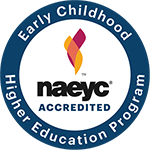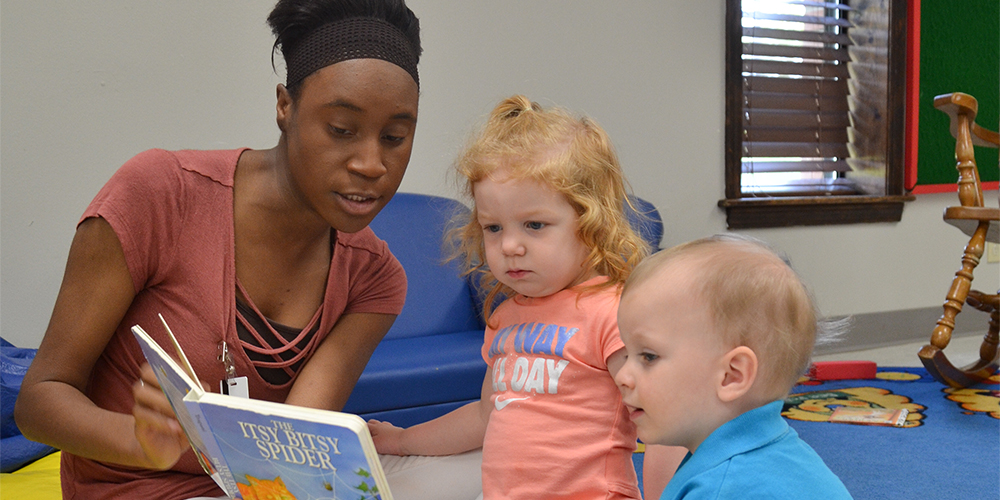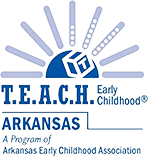Career-Specific Program Overview
The Early Childhood Education program combines classroom study and field experience with children from birth to eight years of age. Students gain an understanding of the social, emotional, intellectual, and physical growth and development of all children within an inclusive environment.
Courses needed to complete the Certificate of Proficiency and much of the Technical Certificate and Associate of Applied Science Degree have the flexibility to meet a working student's busy schedule. Classes can be attended face-to-face one day and online when it's not possible to make it to campus, or attend completely online. Students also have the option to stream a class live online (Synchronously) or watch a recorded session later that day (Asynchronously).
Completion of the A.A.S. program includes 210 hours of field experience, which is gained through fully-licensed child care centers and quality cites.
Career Opportunities
- Child care facility owners and directors
- Child care center directors
- Head Start teachers
- Infant/toddler teachers
- Preschool teachers
- Assistant teachers
- Paraprofessionals
- Arkansas Better Chance Preschool paraprofessionals
Degree Options
Program Learning Outcomes
Students who successfully complete the Certificate of Proficiency in Early Childhood Education will be able to:
Child Development and Learning in Context
- Understand the developmental period of early childhood from birth through age 8 across developmental domains.
- Understand that children learn and develop with relationships and within multiple contexts, including families, cultures, languages, communities, and society.
- Use multidimensional knowledge to make evidence-based decisions about how to carry out their responsibilities.
Family-Teacher Partnerships and Community Connections
- Know about, understand, and value the diversity in family characteristics.
- Use understanding to create respectful, responsive, reciprocal relationships with families and to engage them as partners in their young children’s development and learning.
Professionalism as an Early Childhood Educator
- Identify and participate as members of the early childhood profession. They serve as informed advocates for young children, for the families of the children in their care, and for the early childhood profession.
Early Childhood Education Program Learning Outcomes align with NAEYC Standards.
Program Learning Outcomes
Students who successfully complete the Technical Certificate in Early Childhood Education will be able to:
Child Development and Learning in Context
- Understand the developmental period of early childhood from birth through age 8 across developmental domains.
- Understand each child as an individual with unique developmental variations.
- Understand that children learn and develop with relationships and within multiple contexts, including families, cultures, languages, communities, and society.
- Use multidimensional knowledge to make evidence-based decisions about how to carry out their responsibilities.
Family-Teacher Partnerships and Community Connections
- Know about, understand, and value the diversity in family characteristics.
- Use understanding to create respectful, responsive, reciprocal relationships with families and to engage them as partners in their young children’s development and learning.
- Use community resources to support young children’s learning and development and support children’s families, and they build connections between early learning settings, schools, and community organizations and agencies.
Developmentally, Culturally, and Linguistically Appropriate Teaching Practices
- Understand and demonstrate positive, caring, supportive relationships and interactions as the foundation for their work with young children.
- Understand and use teaching skills that are responsive to the learning trajectories of young children and to the needs of each child.
- Use a broad repertoire of developmentally appropriate and culturally and linguistically relevant, anti-bias, and evidence-based teaching approaches that reflect the principles of universal design for learning.
Knowledge, Application, and Integration of Academic Content in the Early Childhood Curriculum
- Understand the central concepts, the methods and tools of inquiry, and the structures in each academic discipline.
- Understand pedagogy, including how young children learn and process information in each discipline, the learning trajectories for each discipline, and how teachers use this knowledge to inform their practice.
- Apply knowledge using early learning standards and other resources to make decisions about spontaneous and planned learning experiences and about curriculum development, implementation, and evaluation to ensure that learning will be stimulating, challenging, and meaningful to each child.
Professionalism as an Early Childhood Educator
- Identify and participate as members of the early childhood profession. They serve as informed advocates for young children, for the families of the children in their care, and for the early childhood profession.
- Know and use ethical guidelines and other early childhood professional guidelines.
Early Childhood Education Program Learning Outcomes align with NAEYC Standards.
Program Learning Outcomes
Students who successfully complete the Associate of Applied Science degree in Early Childhood Education will be able to:
Child Development and Learning in Context
- Understand the developmental period of early childhood from birth through age 8 across developmental domains.
- Understand each child as an individual with unique developmental variations.
- Understand that children learn and develop with relationships and within multiple contexts, including families, cultures, languages, communities, and society.
- Use multidimensional knowledge to make evidence-based decisions about how to carry out their responsibilities.
Family-Teacher Partnerships and Community Connections
- Know about, understand, and value the diversity in family characteristics.
- Use understanding to create respectful, responsive, reciprocal relationships with families and to engage them as partners in their young children’s development and learning.
- Use community resources to support young children’s learning and development and support children’s families, and they build connections between early learning settings, schools, and community organizations and agencies.
Child Observation, Documentation, and Assessment
- Understand that the primary purpose of assessments is to inform instruction and planning in early learning settings.
- Know how to use observation, documentation, and other appropriate assessment approaches and tools. Early childhood educators.
- Use screening and assessment tools in ways that are ethically grounded and developmentally, culturally, ability, and linguistically appropriate to document developmental progress and promote positive outcomes for each child.
- Build assessment partnerships with families and professional colleagues.
Developmentally, Culturally, and Linguistically Appropriate Teaching Practices
- Understand and demonstrate positive, caring, supportive relationships and interactions as the foundation for their work with young children.
- Understand and use teaching skills that are responsive to the learning trajectories of young children and to the needs of each child.
- Use a broad repertoire of developmentally appropriate and culturally and linguistically relevant, anti-bias, and evidence-based teaching approaches that reflect the principles of universal design for learning.
Knowledge, Application, and Integration of Academic Content in the Early Childhood Curriculum
- Understand the central concepts, the methods and tools of inquiry, and the structures in each academic discipline.
- Understand pedagogy, including how young children learn and process information in each discipline, the learning trajectories for each discipline, and how teachers use this knowledge to inform their practice.
- Apply knowledge using early learning standards and other resources to make decisions about spontaneous and planned learning experiences and about curriculum development, implementation, and evaluation to ensure that learning will be stimulating, challenging, and meaningful to each child.
Professionalism as an Early Childhood Educator
- Identify and participate as members of the early childhood profession. They serve as informed advocates for young children, for the families of the children in their care, and for the early childhood profession.
- Know and use ethical guidelines and other early childhood professional guidelines.
- Communicate with professional communication skills that effectively support their relationships and work with young children, families, and colleagues.
- Engage in continuous collaborative learning.
- Develop and sustain the habit of reflective and intentional practice in their daily work with young children and as members of the early childhood profession.
Early Childhood Education Program Learning Outcomes align with NAEYC Standards.

The A.A.S. in Early Childhood Education program at UACCM is accredited by the Commission on Early Childhood Higher Education Programs of the National Association for the Education of Young Children, 1313 L Street NW, Suite 500, Washington DC 20005. (800) 424-2460 ext. 8007. The accreditation term runs from November 2019 to July 2025.
Requirements
- Clean criminal background check
- Clean child maltreatment check
- FBI background check (if an Arkansas resident for less than six years)
- Some courses require recent influenza immunization and TB test.
- Ability to lift up to 50 pounds and stand for prolonged periods of time.

